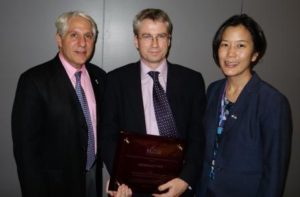Distinguished Achievement Award
Acceptance Remarks: Nicholas Fyfe
2014 Recipient
The following are remarks by Nicholas Fyfe, Director of the Scottish Institute for Policing Research (SIPR) and Professor of Geography, University of Dundee upon receipt of the Distinguished Achievement Award in Evidence-Based Crime Policy in Scotland on October 21, 2014.
 Receiving this award is a huge honor and I first want to express my thanks to David, Cynthia, and the CEBCP nominating committee. The work of CEBCP has been a great inspiration to me in my role as director of the Scottish Institute for Policing Research (SIPR). The quality of CEBCP’s research, its commitment to independence and relevance, its focus on working with practitioners and the policy community, and its investment in knowledge exchange and knowledge translation are all things which we in Scotland have learned a great deal from over the years and so it is a particular pleasure and honor to receive this award from your center.
Receiving this award is a huge honor and I first want to express my thanks to David, Cynthia, and the CEBCP nominating committee. The work of CEBCP has been a great inspiration to me in my role as director of the Scottish Institute for Policing Research (SIPR). The quality of CEBCP’s research, its commitment to independence and relevance, its focus on working with practitioners and the policy community, and its investment in knowledge exchange and knowledge translation are all things which we in Scotland have learned a great deal from over the years and so it is a particular pleasure and honor to receive this award from your center.
Although I was disappointed not to be able to travel to the United States to receive the award earlier in the year, there is something very special about receiving it here in Scotland at the Scottish Police College during this, the second SIPR-Mason symposium, with so many friends and colleagues from SIPR and those involved in Scottish policing and policing research. This is partly because I see this award as a recognition of our collective endeavors, one that recognizes the achievements of SIPR’s unique strategic partnership between 12 universities and the Scottish police service as much as my individual contribution; and partly because it was here at the Scottish Police College in October 2006 that we launched SIPR. I have dusted down the notes that I prepared for my speech that day because so much of what I said then is still very relevant now, but you will be relieved to know that I am not going to repeat the whole of that speech (particularly those of you who heard it eight years ago!). However, there is one short passage about aims and opportunities that I think is worth repeating. In terms of SIPR’s aims, I highlighted how the institute would build on the foundations of existing policing research in Scotland to undertake high-quality research of relevance to the police and enhance processes of knowledge transfer and exchange so that research can provide the basis for informed, evidence-based contributions to policy and practice. In terms of opportunities, I highlighted how the institute would increase the capacity and opportunities for relevant, applicable research via investment in new lectureships, in postdoctoral and PhD positions, and in practitioner fellowships that support police personnel to access research evidence and learn new research skills. I also highlighted how the institute would increase opportunities for “adding value” to research via new knowledge transfer structures and knowledge exchange activities, including joint police-academic seminar programs, conferences, and continuing professional development courses.
In the eight years since I made that speech, SIPR has exceeded expectations in terms of delivering on its aims and creating opportunities, and its structure of collaboration between higher education institutions and policing. Its development of a culture of engagement and a relationship of trust between academics and police practitioners is now admired across the world. There are particular people and organizations represented here this evening who I would like to thank for making SIPR such a success. In terms of its origins, it was Peter Wilson who, while a chief constable and president of the Association of Chief Police Officers in Scotland, first had the vision of a policing research institute in Scotland, which started the process that led to SIPR. Since then a small group of academics and police colleagues have invested a great deal of time and energy over the years as members of the SIPR Executive Committee, steering the strategic development of the institute. These include Dr. Alistair Henry (University of Edinburgh and lead for the network on Police-Community Relations); Professor Jim Fraser (University of Strathclyde and lead for the network on Evidence and Investigation); Professor Tara Fenwick (University of Stirling and lead for the network on Education and Leadership); Deputy Chief Constable Neil Richardson OBE; Deputy Chief Constable Iain Livingstone; Dr. Tom Nelson OBE (director of Forensic Services); and Tim Heilbronn (SIPR administrator and knowledge exchange manager).
Finally, if it wasn’t for the wider community of researchers (from postgraduates to established academics), police practitioners (from constables to chief officers), and colleagues in those organizations we work so closely with (including Her Majesty’s Inspectorate of Constabulary, the Scottish Police Authority and the Scottish government), we would not have been able to achieve all that we have done over the last eight years in terms of supporting evidence-based approaches, innovation, and professional development in policing.
In closing there are two other issues I want to highlight. The first concerns the state of policing research. A few years ago I was asked to deliver the keynote lecture at the CEPOL (European Police College) Research and Science Conference about the future of police science and I focused on three “Ps.” The first P concerned the ‘paradox’ of police science: that despite the increase in volume of policing research in recent years, the extent to which this research is used in policy and practice has remained limited. The second P was about “paradigms” and the way that a paradigm shift in the relationship between science and policing is now underway, involving greater use of evidence to inform police decision-making. The third P was about “pluralism” and the need for a plurality of approaches in order to achieve the effective integration of research evidence into discussions about police policy and practice. Furthermore, this commitment to pluralism, I argued, also needed to extend to how we think about the different uses of police research, the different types of intervention researchers make into public discourse about policing, and the different institutions that exist to promote the development and use of police research. What is particularly special about this evening is that so many of the people whose work and activities I referenced in my lecture and who have contributed so much to addressing the paradox of police research, to shifting paradigms, and to promoting pluralism are here: not only Cynthia and David but Peter Neyroud (University of Cambridge and a previous recipient of this award), Gloria Laycock (University College London), Betsy Stanko (Mayor’s Office of Police and Crime), Jenny Fleming (University of Southampton), and Sandra Nutley (University of St. Andrews).
My final point is that a significant and continuing challenge for policing research is to find a way of helping inform police decision making at a time when public and political pressures for “quick fixes” are growing. Now more than ever the police need a knowledge base for professional practice that can help inform a vision of “good policing” in democratic societies that promotes better public security, a reduction in crime, enhanced social justice, and the protection of liberty and human rights. This requires bringing together the insights generated by a plurality of approaches to police research and drawing on what we know about effective mechanisms for knowledge exchange between researchers and practitioners. Police research should provide critical insights into, and reflections on, what constitutes good policing in democratic societies, and through contributions to police education, policy, and training, help stimulate the intellectual development, critical thinking, and problem-solving skills of all those who work in and with police organizations. That is exactly what CEBCP has been doing so effectively over many years and it is what SIPR is also clearly focused on. This award recognizes that work and I am deeply honored to receive it.
